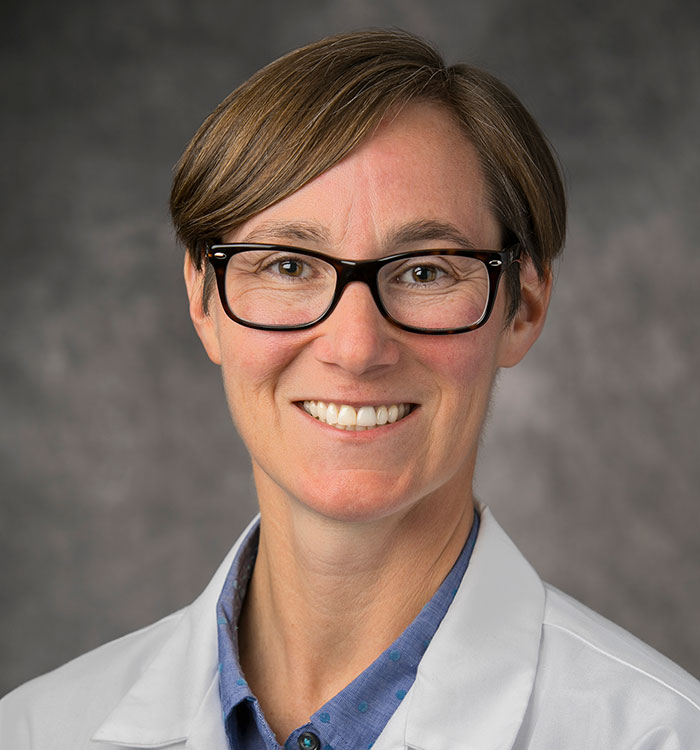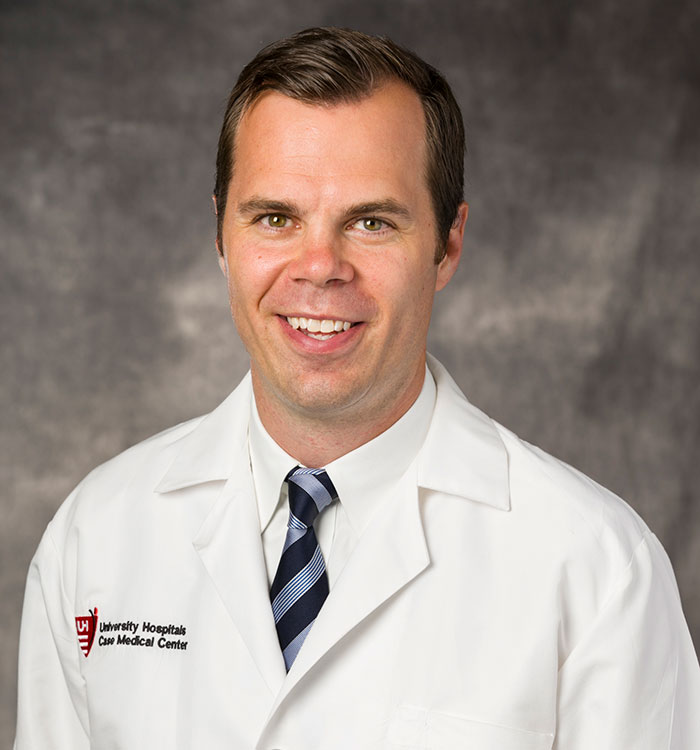Concussion Management Program Delivers Integrated Care
August 30, 2018
Physicians also investigate ways to put youth athlete testing on par with pros
UH Innovations in Orthopaedics - Fall 2018
 Susannah Briskin, MD
Susannah Briskin, MD Christopher Bailey, PhD
Christopher Bailey, PhD James Voos, MD
James Voos, MDConcussion is one of the most common injuries among adolescent athletes, yet it's one of the most difficult to diagnose. A doctor can't see a concussion during a physical exam, and the injuries usually don't show up on an MRI or CT scan because they don't involve a structural change.
To diagnose concussion, physicians generally rely on patient-reported symptoms and cognitive tests. To make diagnosis even trickier, certain symptoms may not manifest until days after injury.
The University Hospitals Concussion Management Program (CMP) ensures UH athletic trainers, primary care sports medicine specialists and other physicians receive the latest training to identify and treat concussions. It also provides baseline and follow-up testing for athletes, school teams and sports organizations to help determine when it's safe to return to play.
"We've seen a huge increase in concussion numbers," says Susannah Briskin, MD, Pediatrician, Primary Care Sports Medicine Specialist, UH Rainbow Babies & Children's Hospital; Associate Professor of Pediatrics, Case Western Reserve University School of Medicine. “We created the Concussion Management Program to train primary care physicians to become better educated in concussion management, providing greater access points closer to home."
CONCUSSION MANAGEMENT ON THE FIELD
Concussion management starts on the field – with the 40-plus athletic trainers that work in regional school systems. “Our trainers have expertise in recognizing concussions and triaging our athletes,” says James Voos, MD, Head Team Physician, The Cleveland Browns, Division Chief, Sports Medicine, Chairman, Department of Orthopaedic Surgery, UH Cleveland Medical Center, Medical Director, Sports Medicine Institute, University Hospitals; Associate Professor, Orthopaedics, Case Western Reserve University School of Medicine “They are on the fields with the kids every day, so they are our treatment program’s front lines.”
Sports medicine physicians provide concussion care to middle school soccer players, professional football players and everyone in between. Physicians interested in treating concussion patients attend annual training to stay up to date on the latest resources and treatment protocols.
A multidisciplinary team led by neuropsychologist Christopher Bailey, PhD, Director, Adult Neuropsychology Postdoctoral Fellowship, UH Cleveland Medical Center, Director, Sports Medicine Concussion Center, Director, Neurological Institute Concussion Program, University Hospitals, and Associate Professor of Neurology, Case Western Reserve University School of Medicine, designed the training program. It covers basic concussion awareness, management and recovery as well as how to identify complex cases such as hemorrhages and spinal injuries.
Physicians also learn how to use baseline and follow-up testing provided by CMP partner Immediate Post-Concussion Assessment and Cognitive Testing (ImPACT™), a widely recognized concussion management tool. The test – recommended for sports teams and athletes ages 12 and up – assesses memory, concentration and reaction speed. When an athlete suffers a concussion, doctors can compare pre- and post-injury test results to determine recovery and return to play.
“Most people feel normal before their brain fully heals,” Dr. Briskin says. “Computerized testing adds an extra layer of information to help with recovery.”
A MULTIDISCIPLINARY APPROACH
Most concussion patients recover relatively quickly, Dr. Bailey says. CMP's multidisciplinary team offers a distinct advantage for the 10 to 20 percent of patients that don't. Treatment includes, as needed, referrals to physical therapists, neuropsychologists, neurologists, ENT physicians, neurosurgeons and dentists.
“Our physician network knows how to identify when a person needs those resources and how to use them,” Dr. Bailey says. “Our Rainbow sports medicine providers know the presentations of a child compared with an adult or teen. They can present differently.”
As the healthcare partner for pro football’s Cleveland Browns, UH offers patients elite-level benefits. “Our medical team sits at all NFL scientific meetings and helps develop the most up-to-date concussion treatment,” Dr. Voos says. “The NFL devotes a great amount of resources to protect their players. We take that same information and translate it for our youth and other athletes.”
ADVANCING CONCUSSION RESEARCH
While the Browns medical team is participating in the development of new neuropsychological assessments for a new concussion baseline test, CMP physicians are investigating ways to improve youth athlete testing. “Most of the evaluation measures are designed for adults,” says Dr. Bailey. “We're testing local youth athletes to understand whether it makes sense to use kid-specific tests.”
Dr. Bailey and team are also investigating whether light, supervised exercise can speed recovery of persistent concussion symptoms. “We've found that standard treatment – total rest – may not provide the best benefit over time,” he says. “The newest treatments involve light activity as tolerated. We're working through pilot study data to understand the response to this treatment.”
Last year, the Sports Neuropsychology Society hosted its annual Concussion Symposium at UH, bringing together NFL, NHL and MLS consultants with medical and academic experts. “The event shows how we can share our knowledge outside our community,” Dr. Bailey says.
To refer a patient to CMP, call 216-983-PLAY. To learn more about physician training, contact Dr. Christopher Bailey at (216) 844-3422.


